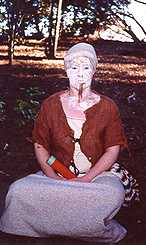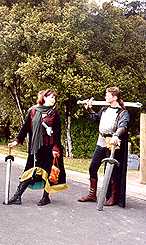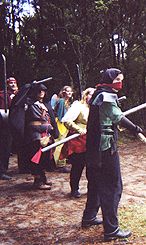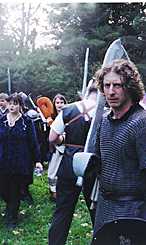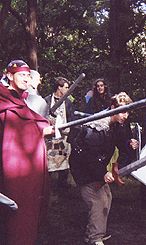 |
||||||||||||||||||||||||||||||||||||||||||||||||||||||||||||||||||||||||||||||||||||||
|
Advantages are options available to characters (and to some NPCs) that describe characteristics that set them apart from other people.
These characteristics are not merely game mechanics. Players should roleplay the use of their advantages, and make the possession of
the advantage part of their character's background.
Magic
 You are a Novice in a college of Magic. Select a college from the Magic section. As a Novice you can cast any Novice
spell in your college, or any Novice Grey spell. You can only cast a spell if you have the appropriate scroll for it, but you can
cast the spell as often as you like. You can buy scrolls before the game using your starting income or during the game from
traders, or loot them from fallen enemies. See Equipment for the scroll prices.
You are a Novice in a college of Magic. Select a college from the Magic section. As a Novice you can cast any Novice
spell in your college, or any Novice Grey spell. You can only cast a spell if you have the appropriate scroll for it, but you can
cast the spell as often as you like. You can buy scrolls before the game using your starting income or during the game from
traders, or loot them from fallen enemies. See Equipment for the scroll prices.
No one knows exactly why some people can practice magic, and others seem unable. Likewise, it's unknown why some people find that they can easily attune to one college of magic, and others to a different college. Typically, magical abilities will be noticed by an Adept wizard, who trains the new magic user to use Novice magics. Some people develop to this stage naturally. Recently classes have been opening up in some of the larger towns in Mordavia, where parents can pay to have their children trained in magic. Most of these students flunk, as they simply don't have the innate abilities required, but many wealthy parents are willing to risk their silver on the off-chance of a magical child. While some students can reach Novice stage without the need of a teacher, to become an Adept requires not only intense practice with the magic but also a period of apprenticeship to an Adept of the college. This apprenticeship is traditionally very demanding on the student, and the Adept teacher can potentially profit greatly from it. Roleplaying Magic
The way that spells are cast determines how the magician's powers are perceived. If the magician mumbles the chant, or
races through it as fast as they can, the magic will be seen as a boring game mechanic. But if the magician puts drama into their
spell deliveries, and has an air of mystery, they will be given the respect that a scholarly mystic deserves.
Magic provides many other opportunites for roleplaying. The selection of a particular college of magic may reflect some part of the character's nature - nurturing for White, wild for Elemental, and so on. The player may decide that their character gets their powers through some particular discipline or practice, which they must perform every day. The character could have a mystical theory on the nature of magic. This kind of creativity gives both other players and the game organisers something colourful to work off in playing their own parts or building the game environment. Noble
You are of high birth. You start with 120 kopeks. Commoners can be charged with treason if they disrespect you.
Please wear an elegant costume. You cannot take the Guild or Armouring advantages. You must have 2 non-noble players as
your retinue. These players should note on their character sheets that they have sworn loyalty to you. The number of
retainers required may be reduced for day games. To be a noble in Mordavia means that your family hold a
fiefdom within Mordavia at least the size of a town and its surroundings. To retain your lands you pay a tithe to the King
consisting of goods, money, and soldiers. You rely on the guild houses to maintain the economic and social well being of your fiefdom. At each game you will have
several contracts that you need a guild member to sign. You begin with the title of Baron or Baroness. If you are
successful in maintaining your lands you can increase your tithing and be granted more land and greater title. If you fail to
maintain your fiefdom or to bring 2 retainers to the game you will be reduced to Minor Noble and only start with 90 kopeks.
Being noble means more than extra money and a power trip. The system of nobility is deeply rooted in the medieval mindset of Mordavians, so that nobles are regarded as complete social superiors to everyone else. Most commoners will be hesitant to even speak to "our betters", lest they are accused of having ideas "above our station in life". In Mordavia, nobility is directly linked to the possession of land. Only nobles can own land, commoners are merely given permission to build and live on it. In the case of Fairy nobles, nobility indicates special diplomatic privilages that give them the same level of influence as a local noble. The extra income available to nobles reflects the fact that they are receiving, directly or indirectly, taxes from the ownership of their land. Roleplaying a Noble
The most important aspect of roleplaying a noble is how other people act towards you. If all the people
around you address you as "my lord" or "my lady", bow or curtsey to you, and show you deference, then you're a noble. If they treat you
like a wealthy adventurer, you're not. For that reason, it's vitally important that you set yourself apart as being a noble right
from the start of the game. The best way to achieve roleplaying nobility is to arrive at the game with a number of followers or
retainers, who treat you with this kind of deference right from the start. Once other players see them doing it, they will follow
suit. And then NPCs will too, and you'll really get the advantages of your nobility. Nobility should be fairly rare among adventurers
- after all, most nobles are too busy looking after their land or court to go frolicking and risking their lives.
Costuming a Noble
As a noble, you need to be particularly careful about how you dress and the gear you have. Nobles use fine fabric, costly colours, and
impressive designs to display their station in life. Noble warriors may have finely detailed armour, and shields bearing the insignia
of their estate. If you're not willing to organise a really nice costume, don't be a noble.
Sapping
By hitting a person in the back of the head with a sap you can knock them out for 1 minute. They do not lose any Armour
Points or Health Points. You can easily sap people when they are incapacitated. Be gentle when sapping.
To use the Sapping advantage you must have a sap. Saps can be purchased before events for 3 kopeks or during games
from a trader. You cannot create a sap during the game. A balled sock inside another sock represents the sap.
Sapping has no effect if the target is wearing a helm or is undead.
The skill of sapping is one usually learnt by the shadier sides of Mordavian culture. It's a most prized ability among muggers, as it provides a way to knock their victims unconscious so that they can be relieved of any surplus wealth, without the attacker being seen or risking the certain death that comes with a murder charge. The skill is also sometimes learned by soldiers so that they can take enemies captive for interrogation. Roleplaying Sapping
Preferably, the target should not be aware of your presence. While any hit to the back of the head is strictly
allowed, attacking someone face-on with a blackjack and getting it to wrap around and hit them on the back of the head is bad play.
However, attacking someone from behind in the midst of combat is fully allowable. Sapping should never be used on friends or in jest, as
it is has very unpleasant side-effects. Sapping is a form of assault, and using it against citizens is Disturbing the Peace.
Roleplaying being Sapped
If you are sapped, just try to estimate 1 minute of unconsciousness as best you can (count to 60), and disregard anything that
happened while you were knocked out, because you wouldn't remember it. You are likely to wake up with a shocking headache, a big lump
or bruise on their head, and nausia.
Righteous
You are able to channel powers of life through a holy symbol. Hold forth your holy symbol and invoke your gods to
repel lesser undead creatures such as ghouls, zombies, and rogue vampires. Use the word “righteous” in your invocation to
remind the target of the ability that you are using, but please use your imagination and don’t just say “righteous”. Avoid
using the word “holy” in your rhetoric, as that word is used for the Holy ability. That ability is described under Advancement.
Righteous characters have an inner strength of will that allows them to force unholy creatures to stay clear of them. The righteous character must have a holy symbol to use for this, and must hold it in an outstretched hand and call upon whatever divine powers they believe in to repel an unholy creature. An unholy creature cannot approach the character while the symbol is being held towards them and the character is continuing to invoke the divine. Exactly which creatures are affected by this ability is something that the righteous character must figure out by experimenting. However, it is certain that the many ghouls that come from the swamp can be repelled by it, and that rogue vampires can be. Righteous Roleplaying
A righteous character should use "invoking the divine" as an opportunity to reinforce their character concept. They
should either write an appropriate invocation in advance, or invent one spontaneously in the game. A generic invocation might be
something like "Back in the name of all that is good, for I am a righteous servant of the divine! Stay back foul fiends!" and so forth.
You should include the word "righteous" into the invocation somewhere, as it reminds the target what ability is being used,
which is especially useful in the dark. However, the invocation should never just be "righteous! righteous! righteous!" as this reduces
the ability to a mere game mechanic, and misses a great chance for roleplaying.
Being Righteously Repelled
If you are playing a rogue vampire (or an NPC playing a ghoul), it is quite possible that you will be repelled with the Righteous
advantage during a game, so you should be prepared to roleplay the effects. Cowering, shielding your face from the sight of the
holy symbol, and hissing in pain are all good ways to convey that you are a creature with a bit of an evil streak being subdued by the
forces of light. If the righteous character is particularly impressive in how they deliever their invocation, you should grovel on the ground,
flee from them, or be affected by it even if the symbol wasn't directed at you.
Armouring
You can repair armour, restoring its Armour Points to full value. You can only do this at a smithy. First collect an
armouring fee of at least 3 kopeks, the amount fixed by the Artisans Guild. Keep 2 kopeks and put the other kopek in a
Guild collection box at the smithy to cover materials and tax. To repair your own armour you only need to pay the Guild’s
kopek. Take the wearer’s torso armour and roleplay repairing it at the smithy. Having Armouring doesn’t make you a guild
member; you are just using a service they provide. You can also acquire armour before games at half the listed price.
When armour is damaged in combat, it loses some or all of its protective value. This represent dents and rips in the armour that make it less wearable. Using the Armouring advantage allows a character to beat out the dents and patch up the rips, thus returning the armour to its full protective value. Roleplaying Armouring
To be slightly believable, it helps if the armourer roleplays the act of repairing armour using tools at the smithy. This should take some
time.
Tough
You can endure more pain and blood loss than the average person. You have one extra Health Point. You can take this
advantage multiple times, increasing your maximum Health Points by one each time.
Having this advantage can represent either a naturally strong constitution, or conditioning that comes from being trained as a soldier. Guild
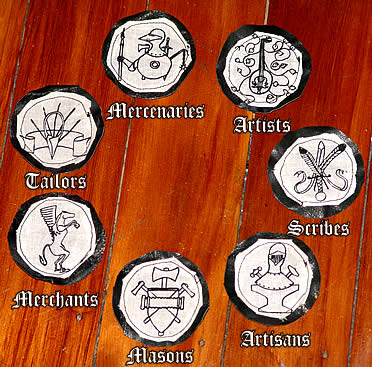 You have finished your apprenticeship and you’re now a journeyman in a guild house. A successful guildsperson can
often have more disposable income than a noble, without the requirement for retainers. Berium is on a major trade route, and
many guild houses are sending journeymen there to sign contracts on their behalf. Your job is to make contracts with
nobles who want to acquire the services of your guild house. You have an extra 30 kopeks in your starting income; however
it may rise much higher from finder’s fees.
You have finished your apprenticeship and you’re now a journeyman in a guild house. A successful guildsperson can
often have more disposable income than a noble, without the requirement for retainers. Berium is on a major trade route, and
many guild houses are sending journeymen there to sign contracts on their behalf. Your job is to make contracts with
nobles who want to acquire the services of your guild house. You have an extra 30 kopeks in your starting income; however
it may rise much higher from finder’s fees.
You get a finder’s fee for every contract you make on behalf of your guild house. This will increase your starting income at the next Mordavia event. Small, medium, and large contracts will increase your income by 10, 20, and 30 kopeks respectively. You cannot sell more than 40 kopeks worth of contracts or your guild house will be overloaded with work. Choose one of the following guilds for your guild house to belong to: Artisans, Tailors, Masons, Mercenaries, Scribes, Artists or Merchants. You wear a badge identifying you as a journeyman of this guild. Badges will be provided. Decide on a name for your guild house and its location in Mordavia. You may only belong to one guild house. Artisans include blacksmiths, weapon-smiths, armourers, potters, rope-makers, cobblers, jewellers and cartwrights. Tailors manage clothing design and production. They include weavers, seamstresses, dyers, shoemakers and tailors. Masons are stonemasons, woodworkers, architects, and shipwrights. They create dwellings and large structures. Mercenaries take on risky jobs. This frequently involves providing a display of arms, fighting, or using stealth. Scribes are highly educated workers. They include heralds, bookkeepers, scholars, bankers, and stewards. Artists include musicians, painters, sculptors, actors and poets. They are paid to entertain, embellish, and enlighten. Merchants buy and sell goods made by others. Many shopkeepers are members of a merchant trade house. Wealth
You have acquired a source of wealth not based on high birth or Guild membership. Invent an interesting explanation
for your wealth. Your starting income is increased by 30 kopeks; however it cannot be further increased by hard work as
for the Guild advantage and lacks the additional benefits of being Noble. You can take this advantage multiple times,
increasing your starting income by 30 kopeks each time.
|
|||||||||||||||||||||||||||||||||||||||||||||||||||||||||||||||||||||||||||||||||||||

